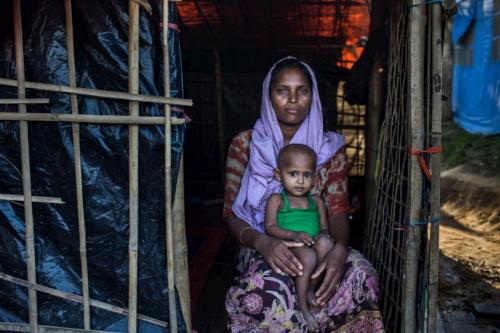Donors pledge US$857 million to protect and assist refugees in 2018
Donor governments on Tuesday pledged an initial US$857 million to UNHCR, the UN Refugee Agency, to fund operations destined to help some 67 million displaced or stateless people worldwide in 2018.

Rohingya refugee Ara, 16, and her 11 month old daughter, Taslima, pictured in Balong Khali refugee camp in Bangladesh.
The pledges, made at an annual meeting in Geneva, amount to around 11 per cent of UNHCR’s total 2018 funding needs of over US$7.5 billion. This year’s pledges are considerably higher than those made at end 2016, when US$701 million was pledged.
While today’s pledges do not cover all of next year’s funding needs, they can be seen as a useful indication of the anticipated funding levels and of overall support, allowing the organization to plan and continue operations that provide life-saving assistance and protection, without interruption. These include operations in some of the biggest emergencies around the world such as those in Iraq, Syria, Yemen, the Democratic Republic of the Congo, South Sudan, Afghanistan and Bangladesh.
While this figure represents the highest level of funds committed by States at this pledging conference, the gap between the funds received and the needs of refugees and other displaced people continues to grow, in a context of new crises and worsening displacement running at record levels.
“A year of no peace and much war is about to end,” said UN High Commissioner for Refugees Filippo Grandi. “Refugee crises grow. Refugee needs grow as well.” He stated that UNHCR is often asked what these figures mean and what the impact of funding gaps is. “It means that UNHCR has to prioritize, sometimes mercilessly,” he explained. “This can mean some (refugees) will be left to fend for themselves during the harsh winter months and others won’t get the assistance they need to reintegrate upon return.”
UNHCR’s work globally is funded almost entirely by voluntary contributions from governments, intergovernmental institutions and, increasingly, from individuals, corporations and foundations. High Commissioner Grandi particularly thanked the countries and communities hosting refugees. “In terms of space, in terms of resources, in terms of the socio-economic and political cost of hosting refugees, they are some of the largest donors in support of refugees.”
For 2018, UNHCR appeals to donors to sustain and increase support, through flexible and early contributions that avoid uncertainty and enable it to channel funds where the needs are greatest.
Source: United Nations High Commissioner for Refugees
- 270 reads
Human Rights
Ringing FOWPAL’s Peace Bell for the World:Nobel Peace Prize Laureates’ Visions and Actions

Protecting the World’s Cultural Diversity for a Sustainable Future

The Peace Bell Resonates at the 27th Eurasian Economic Summit

Declaration of World Day of the Power of Hope Endorsed by People in 158 Nations

Puppet Show I International Friendship Day 2020

